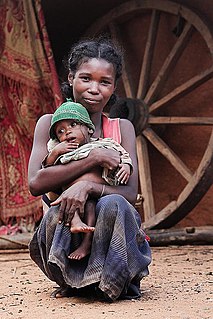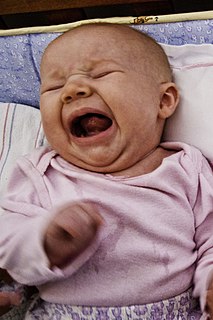 W
WA parent is a caregiver of the offspring in their own species. In humans, a parent is the caretaker of a child. A biological parent is a person whose gamete resulted in a child, a male through the sperm, and a female through the ovum. Biological parents are first-degree relatives and have 50% genetic meet. A female can also become a parent through surrogacy. Some parents may be adoptive parents, who nurture and raise an offspring, but are not biologically related to the child. Orphans without adoptive parents can be raised by their grandparents or other family members.
 W
WABC v. The State is a case decided by a two-judge bench of the Supreme court of India, which held that an unwed woman belonging to the Christian faith can become a legal guardian of her child without the father's consent.
 W
WAlcoholism in family systems refers to the conditions in families that enable alcoholism, and the effects of alcoholic behavior by one or more family members on the rest of the family. Mental health professionals are increasingly considering alcoholism and addiction as diseases that flourish in and are enabled by family systems.
 W
WAlloparenting is a term used to classify any form of parental care provided by an individual towards a non-descendant young. Non-descendant refers to any young who is not the direct genetic offspring of the individual, but does not exclude related young such as siblings or grandchildren. Individuals providing this care are referred to using the neutral term of alloparent.
 W
WAn allowance is an amount of money given or allotted usually at regular intervals for a specific purpose. In the context of children, parents may provide an allowance to their child for their miscellaneous personal spending. In the construction industry, it may be an amount allocated to a specific item of work as part of an overall contract.
 W
WAttachment parenting (AP) is a parenting philosophy that proposes methods aiming to promote the attachment of parent and infant not only by maximal parental empathy and responsiveness but also by continuous bodily closeness and touch. The term attachment parenting was coined by the American pediatrician William Sears. There is no conclusive body of research that shows Sears’ approach to be superior to "mainstream parenting".
 W
WCafeMom is a website targeted to mothers and mothers-to-be. It is owned by Wild Sky Media, which also owns Mom.com, CafeMom, MamásLatinas, and LittleThings.
 W
WCo-sleeping is a practice in which babies and young children sleep close to one or both parents, as opposed to in a separate room. Co-sleeping individuals sleep in sensory proximity to one another, where the individual senses the presence of others. This sensory proximity can either be triggered by touch, smell, taste, or noise. Therefore, the individuals can be a few centimeters away or on the other side of the room and still have an effect on the other. It is standard practice in many parts of the world, and is practiced by a significant minority in countries where cribs are also used.
 W
WIn the common law of crime in England and Wales, a common scold was a type of public nuisance—a troublesome and angry person who broke the public peace by habitually chastising, arguing and quarrelling with their neighbours. Most punished for scolding were women, though men could be found to be scolds.
 W
WA parenting style is a psychological construct representing standard strategies that parents use in their child rearing. The quality of parenting can be more essential than the quantity of time spent with the child. For instance, a parent can spend an entire afternoon with his or her child, yet the parent may be engaging in a different activity and not demonstrating enough interest towards the child. Parenting styles are the representation of how parents respond to and make demands on their children. Parenting practices are specific behaviors, while parenting styles represent broader patterns of parenting practices. There are various theories and opinions on the best ways to rear children, as well as differing levels of time and effort that parents are willing to invest.
 W
WA double burden is the workload of people who work to earn money, but who are also responsible for significant amounts of unpaid domestic labor. This phenomenon is also known as the Second Shift as in Arlie Hochschild's book of the same name. In couples where both partners have paid jobs, women often spend significantly more time than men on household chores and caring work, such as childrearing or caring for sick family members. This outcome is determined in large part by traditional gender roles that have been accepted by society over time. Labor market constraints also play a role in determining who does the bulk of unpaid work.
 W
WA dysfunctional family is a family in which conflict, misbehavior, and often child neglect or abuse on the part of individual parents occur continuously and regularly, leading other members to accommodate such actions. Children sometimes grow up in such families with the understanding that such a situation is normal. Dysfunctional families are primarily a result of two adults, one typically overtly abusive and the other codependent, and may also be affected by addictions, or sometimes by an untreated mental illness. Dysfunctional parents may emulate or over-correct from their own dysfunctional parents. In some cases, the dominant parent will abuse or neglect their children and the other parent will not object, misleading a child to assume blame.
 W
WFamily planning services are “the ability of individuals and couples to anticipate and attain their desired number of children and the spacing and timing of their births. It is achieved through use of contraceptive methods and the treatment of involuntary infertility.” Family planning may involve consideration of the number of children a woman wishes to have, including the choice to have no children and the age at which she wishes to have them. These matters are influenced by external factors such as marital situation, career considerations, financial position, and any disabilities that may affect their ability to have children and raise them. If sexually active, family planning may involve the use of contraception and other techniques to control the timing of reproduction.
 W
WA feral child is a human child who has lived isolated from human contact from a very young age, and so has had little or no experience of human care, behavior or human language. There are several confirmed cases and other speculative ones. Feral children may have experienced severe abuse or trauma before being abandoned or running away. They are sometimes the subjects of folklore and legends, typically portrayed as having been raised by animals.
 W
WA godparent, in many denominations of Christianity, is someone who bears witness to a child's christening and later is willing to help in their catechesis, as well as their lifelong spiritual formation. In the past, in some countries, the role carried some legal obligations as well as religious responsibilities. In both religious and civil views, a godparent tends to be an individual chosen by the parents to take an interest in the child's upbringing and personal development, to offer mentorship or claim legal guardianship of the child if anything should happen to the parents. A male godparent is a godfather, and a female godparent is a godmother. The child is a godchild.
 W
WInfant crying is the crying of infants as a response to an internal or external stimulus. Infants cry as a form of basic instinctive communication. Essentially, newborns are transitioning from life in the womb to the external environment. Up to 27% of parents describe problems with infant crying in the first four months. Up to 38% identify a problem with their infant crying within the first year. Parents can be concerned about the amount of time that their infant cries, how the infant can be consoled, and disrupted sleeping patterns. Colic is used as a synonym for excessive crying of infants, even though colic may not be the cause of excessive crying.
 W
WA latchkey kid, or latchkey child, is a child who returns to an empty home after school or a child who is often left at home with no supervision because their parents are away at work. The term refers to children as young as five years old who provide self-care or to older children who supervise their younger siblings.
 W
WLearning disability, learning disorder or learning difficulty is a condition in the brain that causes difficulties comprehending or processing information and can be caused by several different factors. Given the "difficulty learning in a typical manner", this does not exclude the ability to learn in a different manner. Therefore, some people can be more accurately described as having a "learning difference", thus avoiding any misconception of being disabled with a lack of ability to learn and possible negative stereotyping. In the United Kingdom, the term "learning disability" generally refers to an intellectual disability, while difficulties such as dyslexia and dyspraxia are usually referred to as "learning difficulties".
 W
WParental leave, or family leave, is an employee benefit available in almost all countries. The term "parental leave" may include maternity, paternity, and adoption leave; or may be used distinctively from "maternity leave" and "paternity leave" to describe separate family leave available to either parent to care for small children. In some countries and jurisdictions, "family leave" also includes leave provided to care for ill family members. Often, the minimum benefits and eligibility requirements are stipulated by law.
 W
WParental experience, as well as changing hormone levels during pregnancy and postpartum, cause changes in the parental brain. Displaying maternal sensitivity towards infant cues, processing those cues and being motivated to engage socially with her infant and attend to the infant's needs in any context could be described as mothering behavior and is regulated by many systems in the maternal brain. Research has shown that hormones such as oxytocin, prolactin, estradiol and progesterone are essential for the onset and the maintenance of maternal behavior in rats, and other mammals as well. Mothering behavior has also been classified within the basic drives. Less is known about the paternal brain, but changes in the father's brain occur alongside the mother once the offspring is born.
 W
WBullying is the use of force, coercion, or threat, to abuse, aggressively dominate or intimidate. The behavior is often repeated and habitual. One essential prerequisite is the perception of an imbalance of physical or social power. This imbalance distinguishes bullying from conflict. Bullying is a subcategory of aggressive behavior characterized by the following three minimum criteria: (1) hostile intent, (2) imbalance of power, and (3) repetition over a period of time. Bullying is the activity of repeated, aggressive behavior intended to hurt another individual, physically, mentally, or emotionally.
 W
WParental controls are features which may be included in digital television services, computer and video games, mobile devices and software that allow parents to restrict the access of content to their children. These controls were created to assist parents in their ability to restrict certain content viewable by their children. This may be content they deem inappropriate for their age, maturity level or feel is aimed more at an adult audience. Parental controls fall into roughly four categories: content filters, which limit access to age inappropriate content; usage controls, which constrain the usage of these devices such as placing time-limits on usage or forbidding certain types of usage; computer usage management tools, which enforces the use of certain software; and monitoring, which can track location and activity when using the devices.
 W
WA parenting style is a psychological construct representing standard strategies that parents use in their child rearing. The quality of parenting can be more essential than the quantity of time spent with the child. For instance, a parent can spend an entire afternoon with his or her child, yet the parent may be engaging in a different activity and not demonstrating enough interest towards the child. Parenting styles are the representation of how parents respond to and make demands on their children. Parenting practices are specific behaviors, while parenting styles represent broader patterns of parenting practices. There are various theories and opinions on the best ways to rear children, as well as differing levels of time and effort that parents are willing to invest.
 W
WParents with disabilities are those who are raising children and have disorders in a certain aspect for example mental, physical and so on. There is more accurate classification of different types of disabilities, basing on disabled parents’ physical and mental condition. Disability brings various problems to parents themselves, their children and the whole family. Researchers has been discussing the effects and issued raised by disabled parents. Aiming at helping parents with disabilities, organizations and governments have delivered relevant strategies to provide support.The term ‘disability’ states the existence of one or more restrictions either in any core activities including self-care, mobility and communication, or in employment. And the presence of the specific restrictions needs to be highly possible to last or has been lasted for 6 months or longer to be considered as disability.
 W
WPlay date or playdate is an expression primarily used in the US for an arranged appointment for children to get together for a few hours to play. It should not be confused with dating as there is not an implied romantic component to it.
 W
WSpanking is a common form of corporal punishment, involving the act of striking the buttocks of another person to cause physical pain, generally with an open hand. More severe forms of spanking, such as switching, paddling, belting, caning, whipping, and birching, involve the use of an object instead of a hand.
 W
WA tantrum, temper tantrum, fit or hissy fit is an emotional outburst, usually associated with those in emotional distress, that is typically characterized by stubbornness, crying, screaming, violence, defiance, angry ranting, a resistance to attempts at pacification, and, in some cases, hitting, and other physically violent behavior. Physical control may be lost; the person may be unable to remain still; and even if the "goal" of the person is met, they may not be calmed. Throwing a temper tantrum can lead to a child being placed in timeout, being grounded or even being suspended from school for older school age children. A tantrum may be expressed in a tirade: a protracted, angry speech.
 W
WTime-out is a form of behavioral modification that involves temporarily separating a person from an environment where an unacceptable behavior has occurred. The goal is to remove that person from an enriched, enjoyable environment, and therefore lead to extinction of the offending behavior. It is an educational and parenting technique recommended by most pediatricians and developmental psychologists as an effective form of discipline. Often a corner or a similar space where the person is to stand or sit during time-outs is designated. This form of discipline is especially popular in western cultures.
 W
WWashing out the mouth with soap is a traditional form of physical punishment that consists of placing soap, or a similar cleansing agent, inside a person's mouth so that the person will taste it, inducing what most people consider an unpleasant experience. This form of punishment was especially common in the United States and United Kingdom from the late 19th century until the mid-20th century.